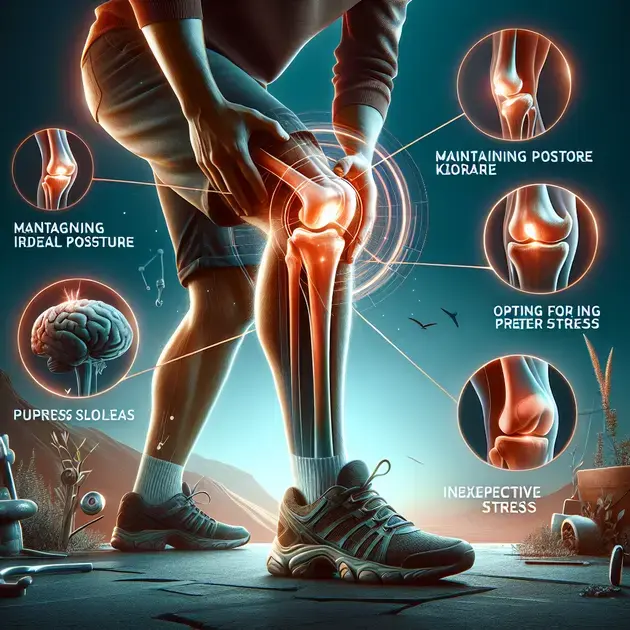Are you struggling with knee pain and unsure of the cause? In this blog post, we will explore The Surprising Causes of Knee Pain that you may not be aware of. Knee pain can be a common complaint, especially among athletes and older adults, but the reasons behind it may be more unexpected than you think.
Recent studies have shown that factors such as poor posture, improper footwear, and even stress can contribute to knee pain. Understanding these lesser-known causes is key to finding relief and preventing further discomfort in the future. So, let’s dive into the unexpected culprits of knee pain and how you can address them effectively.
Common misconceptions about knee pain
When it comes to knee pain, there are several common misconceptions that can lead to improper treatment or management of the condition. One of the biggest misconceptions is that knee pain is always a sign of aging. While it is true that knee pain is more common in older adults, it can affect individuals of all ages due to various factors such as injury, overuse, or underlying medical conditions.
Another misconception is that rest is the best solution for knee pain. While resting the knee may provide temporary relief, it is important to incorporate gentle exercises and stretches to improve strength and flexibility in the surrounding muscles. Additionally, ignoring knee pain in the hopes that it will go away on its own is a common misconception that can lead to worsening of the condition over time.
One common myth is that only athletes or active individuals experience knee pain. In reality, knee pain can occur in anyone, regardless of their activity level. Factors such as genetics, obesity, and improper biomechanics can also contribute to knee pain, highlighting the importance of addressing the root cause of the issue rather than assuming it is solely related to physical activity.
To properly address knee pain, it is essential to consult with a healthcare professional for an accurate diagnosis and treatment plan. Physical therapists, orthopedic doctors, or sports medicine specialists can provide personalized recommendations based on the individual’s specific condition and lifestyle. Additionally, incorporating proper nutrition, weight management, and ergonomic adjustments in daily activities can help alleviate knee pain and prevent future issues.
The impact of poor posture on knee health
Poor posture can have a significant impact on knee health, leading to increased stress and strain on the knee joints. When the body is not properly aligned, it can affect the way weight is distributed across the joints, putting excessive pressure on the knees. This can result in chronic knee pain, inflammation, and degeneration of the cartilage over time.
One way to address the impact of poor posture on knee health is to focus on improving overall body alignment through postural exercises and stretches. Incorporating activities such as yoga, Pilates, or physical therapy exercises can help strengthen the core muscles and improve posture, reducing the strain on the knees.
Using ergonomic furniture and accessories, such as a supportive chair and adjustable desk height, can also help maintain proper posture throughout the day. Taking frequent breaks to stretch and move around can prevent slouching or hunching over, which can contribute to poor posture and knee discomfort.
Additionally, wearing supportive footwear that provides cushioning and proper arch support can help alleviate pressure on the knees and improve overall body alignment. Making small adjustments in daily habits, such as sitting up straight, avoiding crossing the legs for extended periods, and maintaining a healthy weight, can also contribute to better posture and reduced strain on the knees.
Unconventional factors contributing to knee discomfort
While traditional factors such as injury, overuse, or aging are commonly associated with knee discomfort, there are some unconventional factors that may also play a role in exacerbating knee pain. One of these factors is emotional stress, which can manifest physically in the body and contribute to muscle tension and joint stiffness.
Another unconventional factor is environmental toxins, such as air pollution or chemical exposure, which can lead to inflammation in the joints and exacerbate existing knee conditions. Making lifestyle changes to reduce exposure to toxins, such as using air purifiers or choosing organic products, can help alleviate knee discomfort associated with environmental factors.
Dietary choices can also impact knee health, as certain foods high in sugar, processed ingredients, or trans fats can contribute to inflammation in the body. Incorporating anti-inflammatory foods such as fruits, vegetables, and omega-3 rich sources can help reduce inflammation and promote overall joint health.
In some cases, hormonal imbalances or microbial infections in the gut can also play a role in knee discomfort. Consulting with a healthcare provider to address these underlying issues through hormone therapy, probiotics, or dietary changes can help alleviate knee pain associated with unconventional factors.
Hidden triggers behind knee discomfort
When it comes to knee discomfort, there are a variety of hidden triggers that can contribute to the pain. One common trigger is overuse or repetitive strain on the knee joint, which can lead to inflammation and discomfort. This can occur from activities such as running, jumping, or even sitting for long periods with your knees bent. Another hidden trigger is poor posture, as misalignment in the body can put extra stress on the knees and lead to pain.
Additionally, underlying conditions such as arthritis or previous injuries can also be hidden triggers behind knee discomfort. Arthritis can cause inflammation in the knee joint, leading to pain and stiffness. Previous injuries, even ones that have healed, can weaken the knee and make it more susceptible to discomfort.
Being overweight is another hidden trigger for knee discomfort. The excess weight puts added pressure on the knees, leading to wear and tear on the joint and ultimately pain. It’s important to address any hidden triggers behind knee discomfort in order to find relief and prevent further damage to the knees.
Moreover, wearing improper footwear can also be a hidden trigger for knee discomfort. Shoes that lack proper support or cushioning can put strain on the knees and lead to pain. It’s essential to wear supportive footwear that helps to distribute weight evenly and provide stability for the knees.
Overall, understanding and addressing the hidden triggers behind knee discomfort is crucial for managing pain and maintaining healthy knee joints. By identifying and addressing these triggers, individuals can take control of their knee health and enjoy improved mobility and comfort.
The role of footwear in knee pain
Footwear plays a significant role in contributing to knee pain. Wearing shoes that do not provide adequate support or cushioning can lead to increased stress on the knee joints, causing discomfort and potential long-term damage. It is essential to choose footwear that is specifically designed to support the feet and promote proper alignment of the lower body.
High heels are a common culprit when it comes to knee pain, as they can alter the natural alignment of the body and put added pressure on the knees. Flat shoes with minimal arch support can also contribute to knee pain, as they do not provide the necessary cushioning to absorb shock and reduce impact on the knees.
On the other hand, supportive shoes with cushioned insoles and proper arch support can help alleviate knee pain by reducing the amount of stress placed on the knee joints during activities such as walking or running. These shoes help to distribute weight evenly and provide stability for the knees, reducing the risk of discomfort and injury.
Proper footwear is especially important for individuals with preexisting knee conditions or those who are prone to knee pain. By wearing shoes that prioritize support and comfort, individuals can effectively manage knee pain and prevent further complications. It is crucial to invest in quality footwear that is suited to your specific foot type and activity level to promote overall knee health.
In conclusion, the role of footwear in knee pain cannot be understated. By choosing supportive shoes that prioritize comfort and proper alignment, individuals can reduce the risk of knee discomfort and maintain healthy knee joints for years to come.
How stress can affect your knee joints
Stress can have a significant impact on your knee joints, leading to discomfort and potential injury. When we experience stress, our bodies release cortisol, a hormone that can increase inflammation in the body, including the knee joints. This inflammation can lead to pain and stiffness, making it difficult to move and causing discomfort.
Additionally, stress can contribute to muscle tension in the body, which can put added strain on the knee joints. Tight muscles surrounding the knees can pull on the joint and cause misalignment, leading to pain and discomfort. Chronic stress can also weaken the immune system, making individuals more susceptible to conditions such as arthritis that can affect the knee joints.
Emotional stress can also manifest physically in the body, leading to tension in the muscles and joints, including the knees. This physical manifestation of stress can exacerbate existing knee issues or contribute to the development of new pain and discomfort. It is essential to address both the emotional and physical aspects of stress in order to prevent negative effects on the knee joints.
One way to mitigate the impact of stress on your knee joints is through stress management techniques such as mindfulness, yoga, or regular exercise. These activities can help reduce cortisol levels in the body and promote relaxation, easing tension in the muscles and joints. It’s also important to prioritize self-care and relaxation practices to reduce overall stress levels and protect the health of your knee joints.
In conclusion, understanding how stress can affect your knee joints is crucial for maintaining overall joint health and preventing discomfort. By addressing stress through various techniques and prioritizing self-care, individuals can protect their knee joints and mitigate the impact of stress on their physical well-being.
**
Conclusion
**
Understanding the hidden triggers behind knee discomfort is essential for effectively managing pain and maintaining healthy knee joints. Overuse, poor posture, underlying conditions like arthritis, previous injuries, being overweight, and wearing improper footwear are common culprits that can contribute to knee pain. By identifying and addressing these triggers, individuals can take proactive steps to alleviate discomfort, find relief, and prevent further damage to their knees. It’s crucial to be mindful of these hidden triggers and make necessary lifestyle adjustments to prioritize knee health.
Footwear plays a significant role in the development of knee pain. Wearing shoes that lack proper support or cushioning can lead to increased stress on the knee joints, potentially causing long-term damage. Choosing footwear designed to support the feet and promote proper alignment of the lower body is crucial in mitigating knee pain. Selection of supportive shoes with cushioned insoles and proper arch support can help reduce stress on the knee joints during various activities, ultimately enhancing comfort and stability. Investing in quality footwear tailored to individual foot type and activity level is paramount for promoting overall knee health.
Moreover, stress can have a profound impact on knee joints, leading to discomfort and potential injury. The release of cortisol due to stress can increase inflammation in the body, affecting the knee joints and causing pain and stiffness. Muscle tension from stress can also strain the knee joints, contributing to misalignment and discomfort. Addressing emotional and physical stress through mindfulness, yoga, exercise, and self-care practices is crucial in reducing cortisol levels, promoting relaxation, and protecting the health of knee joints. By managing stress effectively, individuals can safeguard their knee joints and prevent adverse effects on their physical well-being.

